Algarve-South-Portugal.com
The best independent guide to Tavira
Algarve-South-Portugal.com
The best independent guide to Tavira
Faro or Tavira for a holiday?
The Algarve continues to be Portugal's most sought-after coastal destination, with its golden coastlines, whitewashed villages, and authentic Portuguese charm drawing visitors year-round.
Within this diverse region, Faro and Tavira stand out as distinctive destinations that offer very different holiday experiences.
Faro functions as the bustling regional capital with excellent connections to the entire Algarve, while Tavira offers a more tranquil, traditional Portuguese experience that feels untouched by mass tourism.
This guide compares their beaches, historical attractions, dining scenes, and practical considerations to help you choose the perfect destination for your Algarve holiday.
Related articles: Faro guide - Tavira guide
Overview of Tavira
Tavira sits gracefully along the banks of the Gilão River, just 40km east of Faro and 25km from the Spanish border. Often described as the Algarve's most charming town, Tavira has preserved its traditional Portuguese character while neighbouring coastal towns have modernized for mass tourism.
The town's appeal lies in its authentic atmosphere - Roman bridges arch over the gentle river, azulejo-tiled buildings line cobbled streets, and the ruins of a Moorish castle crown the historic center. With over 37 churches, Tavira showcases Portugal's rich religious heritage through striking architecture and ornate interiors.
Unlike the resort towns of the central and western Algarve, Tavira maintains a lived-in feel where local life continues alongside tourism. Its beaches, reached by ferry across the protected wetlands of the Ria Formosa, remain relatively uncrowded even in peak season.
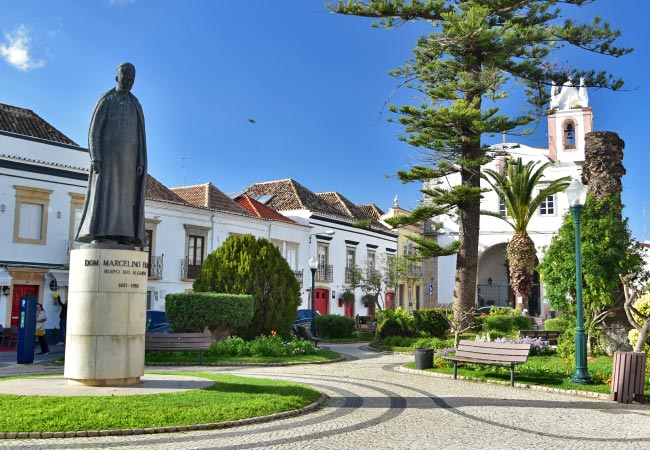
Overview of Faro
Faro serves as both the administrative capital and gateway to the Algarve, with its international airport handling the majority of visitors to the region. Despite its significance, many travellers pass through without exploring the city itself - an oversight that misses Faro's considerable charms.
The city combines practical amenities with historical depth. Its walled Old Town (Cidade Velha) contains medieval buildings, museums, and the impressive 13th-century cathedral, while outside the walls, Faro functions as a working Portuguese city rather than a tourist resort.
Faro's harbour buzzes with boats heading to the beaches of the Ilha de Faro and other sandbars within the Ria Formosa Natural Park. The city offers excellent transport connections throughout the Algarve and beyond, making it ideal for travellers planning to explore the wider region.
Unlike Tavira's tranquil ambiance, Faro provides more urban energy with its university population, shopping districts, and varied nightlife, though it never reaches the intensity of major cities.
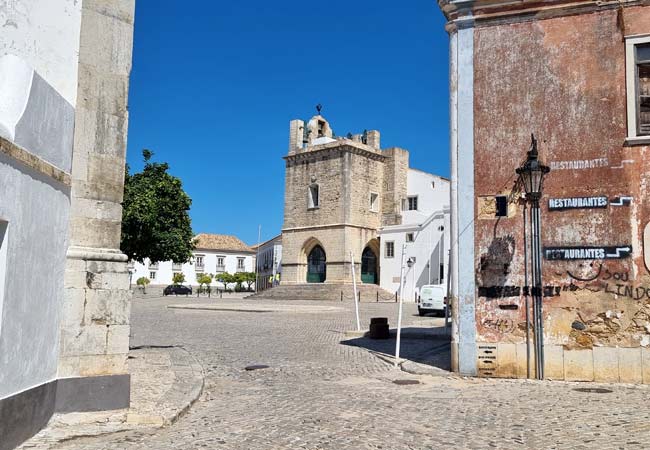
So Tavira or Faro?
While both destinations have distinct merits, Tavira offers the more rewarding holiday experience for most travellers. The town's riverside setting, pristine beaches, and preserved Portuguese character create an authentic Algarve experience that has largely disappeared elsewhere. Tavira's unhurried pace, excellent seafood restaurants spilling onto cobbled squares, and absence of high-rise developments make it ideal for travellers seeking both relaxation and cultural immersion.
Faro serves better as a practical base rather than a dream destination. Its proximity to the airport (just 10 minutes by taxi) makes it perfect for short breaks or as the first stop on a wider Algarve exploration. The city offers genuine Portuguese urban life with its university atmosphere and local markets, but lacks the postcard-perfect charm that most visitors seek from an Algarve holiday.
For first-time visitors to the region who want to experience the Algarve at its most characteristic, Tavira provides the stronger impression without sacrificing convenience or comfort.
Which has the better beaches Faro or Tavira?
Neither Faro nor Tavira has beaches within walking distance of their town centers. Both require transportation - typically a ferry, boat, or bus - to reach their sandy shores, which are situated on barrier islands within the Ria Formosa Natural Park.
Tavira's beaches stretch along the Ilha de Tavira, primarily accessed via ferry from the town center. Praia de Tavira offers extensive facilities and golden sands, while the more distinctive Praia do Barril features the unique Anchor Cemetery and requires a mini-train after reaching Pedras d'el Rei by car or bus.
Faro provides access to three different islands, each with its own character. Ilha de Faro is accessible by road (not just ferry), Ilha Deserta offers unspoiled nature with minimal development, and Ilha da Culatra combines beaches with authentic fishing communities.
Tavira's beaches generally win for sand quality and natural beauty, while Faro offers more variety and, in some cases, easier access options. Both feature clean water and far fewer crowds than western Algarve resorts.
For a pure beach holiday (with minimal character) head or Praia da Rocha.
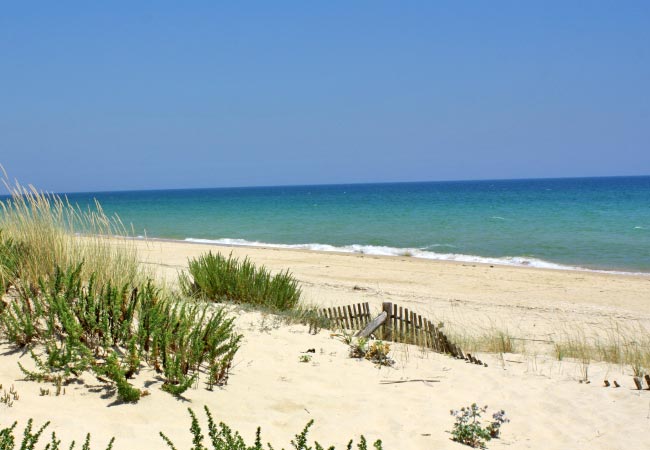
The Praia do Barril close to Tavira
Which is the more charming and traditional?
Faro contains a pretty historic centre surrounded by the ancient Moorish walls but Tavira is by far the more enchanting. Tavira is located along the banks of the Gilão River and pretty house line the narrow cobbled streets. Tavira boasts a relaxed ambience that is difficult to find else were in the Algarve and a selection of interesting historic monuments.
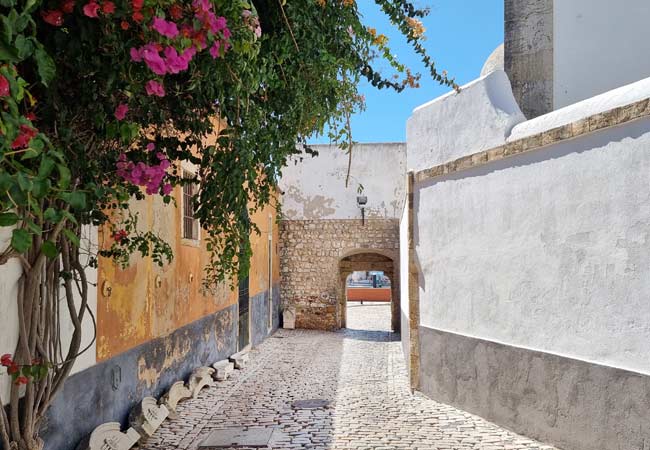
The old quarter in Faro over looking the harbour
Better location for exploring the region?
Faro is the main administrative centre and transport hub for the Algarve. If you are after a holiday that attempts to explore the whole of the Algarve plan to be based close to Faro. The regional railway departs to all locations along the coastline from Vila Real in the east to Lagos in the west, though some of the journeys are painfully slow.
Faro or Tavira, better for families?
Neither Faro nor Tavira ranks among the Algarve's most family-oriented destinations. Both towns present logistical challenges for families, as their beaches require transportation rather than being directly accessible from accommodations. The ferry journeys, while manageable, add complexity to beach days with young children and all their necessary gear.
Tavira offers a slightly more family-friendly atmosphere with its pedestrianized center, riverside walks, and small castle ruins that children can explore.
Faro's attractions tend toward the cultural and historical, which may not engage younger children. However, it does provide better transportation options for day trips to family-focused attractions in the western Algarve, such as Zoomarine, Slide & Splash waterpark, and Lagos Zoo.
For a holiday centered around family entertainment, the western Algarve resorts (Albufeira, Lagos, Carvoeiro) generally provide better infrastructure and activities specifically designed for children.
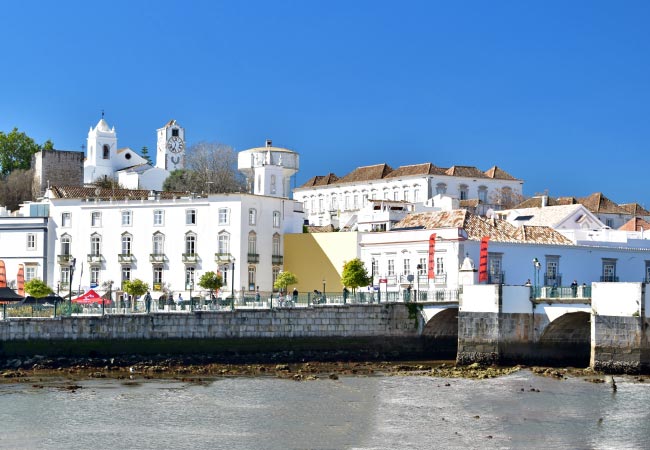
The gentle flow of the Gilão River in Tavira
Our most popular guides to Tavira and the eastern Algarve
Expert Insight: These guides are curated by Philip Giddings, a travel writer with over 25 years of local experience in Portugal. Since 2008, Phil has focused on providing verified, on-the-ground advice for the Algarve region, supported by deep cultural ties through his Portuguese family. Read the full story here.
Algarve-South-Portugal.com, with over 200 pages of holiday guides, if it's not here, it's probably not in the Algarve
Wedding dress shopping- Bridesmaids: who to ask? - Finding a wedding dress - Finding a wedding photographer- Creating a seating plan - Choosing wedding favours




















